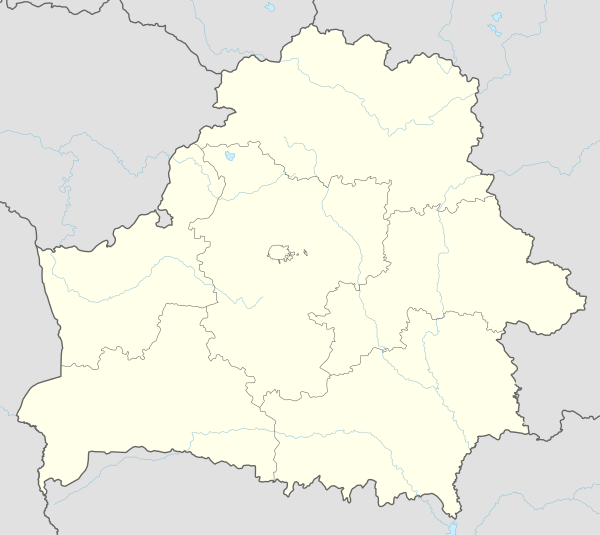Luninets
Luninets (Belarusian: Лунінец, Russian: Лунине́ц,[2] Polish: Łuniniec, Lithuanian: Luninecas, Yiddish: לונינייץ, romanized: Luninitz BGN/PCGN romanization: Luninyets) is a town and administrative centre for the Luninets district in Brest Region, Belarus, before which it was in Poland (1540–1793, 1920–1939) and Russia and the Soviet Union (1793–1920, 1939–1941, 1944–1991). It has a population of some 24,000, and is immediately east of the Pinsk district within Brest. It was home to Luninets air base during the Cold War.
Luninets Лунінец | |
|---|---|
.jpg) | |
 Flag  Coat of arms | |
 Luninets | |
| Coordinates: 52°15′N 26°48′E | |
| Country | |
| Region | Brest Region |
| District | Luninets Raion |
| Mentioned | 1449 |
| Area | |
| • Total | 55 km2 (21 sq mi) |
| Population (2009)[1] | |
| • Total | 23,608 |
| • Density | 430/km2 (1,100/sq mi) |
| Time zone | UTC+2 (EET) |
| • Summer (DST) | UTC+3 (EEST) |
| Postal code | 225642-225644 |
| Area code(s) | +375 1647 |
| License plate | 1 |
| Website | Official website (in Russian) |
History
Luninets is said to be mentioned in print sources dating to 1540. Within the Grand Duchy of Lithuania, it was part of Nowogródek Voivodeship. In 1793, the town was acquired by the Russian Empire in the course of the Second Partition of Poland. In 1888, while under Russian sovereignty, a railway junction was built in Luninets, linking it by rail to Warsaw, Rivne, Vilna and Homel, and a proper railroad station was added in 1905.
Luninets became part of the Second Polish Republic in 1921 following the Polish-Soviet War. In September 1939, Luninets was occupied by the Red Army and, on 14 November 1939, incorporated into the Byelorussian SSR.
Luninets was occupied by Nazi Germany from 10 July 1941 until 10 July 1944 and administered as a part of the Generalbezirk Wolhynien und Podolien of Reichskommissariat Ukraine. After 1944, Luninets remained part of the Soviet Union until 1991, at which time it became part of the newly independent Republic of Belarus.
The Jewish population was important in the town.[3] From 1941 to 1943, 4 000 Jews were murdered in mass executions perpetrated by an Einsatzgruppe.[4][5]
References
- "World Gazetteer". Archived from the original on January 11, 2013.
- D.E. Rosental, Slovar' udarenii dlya rabotnikov radio i televideniya (Moscow, 1984), p. 640.
- "Archived copy". Archived from the original on 2016-06-04. Retrieved 2016-05-12.CS1 maint: archived copy as title (link)
- http://moreshet.pl/he/node/1109
- http://www.yadvashem.org/yv/he/research/ghettos_encyclopedia/ghetto_details.asp?cid=525#!prettyPhoto
External links
| Wikimedia Commons has media related to Luniniec. |
- Site of Belarus city Luninets
- Extensive resource on Jewish Luninets
- Photos on Radzima.org
- Photo and video Luninets
- Luninyets, Belarus at JewishGen
